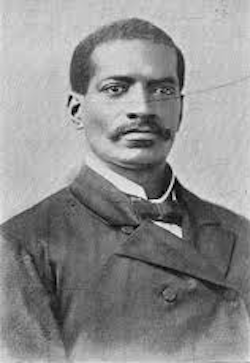
Jerome R. Riley, medical doctor, author, political and civil rights activist, was born in St. Catharines, Canada West on March 17, 1840 to Isaac and Catherine Riley. His father and mother were runaway slaves who made their way from Perry County, Missouri, crossing over to Windsor and on to St. Catharines. In 1849 the family moved to the black settlement established at Buxton, Township of Raleigh, Canada by the Rev. William King. The Rileys were the first group of settlers in Buxton.
From the age of ten Riley was able to recite long passages in Latin from Virgil’s Aeneid and then translate the sense of the verses. In 1856 Riley was among the first four graduates of the Buxton Mission School, where he gained a classical education in an integrated setting—a rarity for its time. In the fall Riley attended University of Toronto, Ontario’s Knox College, graduating with honors. By 1861, Riley received his license to practice medicine in Canada West.
Near the end of the American Civil War in 1864, Riley, at the urging of his close friend, Dr. Anderson Abbott, left his practice in Chatham, Ontario and joined the Union Army as a contract surgeon. He remained in the United States after the War, becoming one of the five original founders of the Freedmen’s Hospital, the forerunner of Howard University Hospital in Washington, D.C.
Riley continued to upgrade his medical knowledge, attending the Chicago Medical College in Illinois for a year in 1869. Dr. Alex Augusta, chief of the medical college, convinced Riley to transfer to Howard University in 1870, from which he a degree in allopathic medicine in 1873.
Soon after graduating Riley moved to Pine Bluff, Arkansas, quickly rising to the post of Jefferson County Physician and Acting Coroner. Unlike most African Americans in this era, Jerome Riley also became an active Democrat and participated in the 1874 Constitutional Convention in Arkansas.
However, by 1877 Riley returned to Washington, D.C. He married the former Agnes N. Nalle of Virginia in August of that year, and in September was hired at Watchman for the U.S. Senate in the Forty-fifth United States Congress.
Riley continued to be involved in Democratic politics, and in 1891 the District of Columbia Democrats elected him as their president. Riley also served two terms as head of the William J. Bryan Colored Democratic Club. In 1899, Riley’s opposition to American imperialism in the wake of the Spanish American War led him to form the National Negro Anti-Expansion, Anti-Imperialist, Anti-Trust, and Anti-Lynching League.
In 1897, The Washington Bee heralded Riley as a “particular genius and the most gifted writer of the African American race.” The comment was made in reference to the second publication of his popular of book, The Philosophy of Negro Suffrage (1895). In 1901 Riley wrote Evolution or Racial Development, followed in 1903 by Reach the Reached Negro.
By the first years of the 20th Century Riley and his wife lived in Seattle, Washington and later in Hartford, Connecticut. When his wife died in 1910 Riley moved to Brooklyn, New York, where he would remain politically active and continue to write and accept speaking engagements until his death at age 89 on December 31, 1929.

